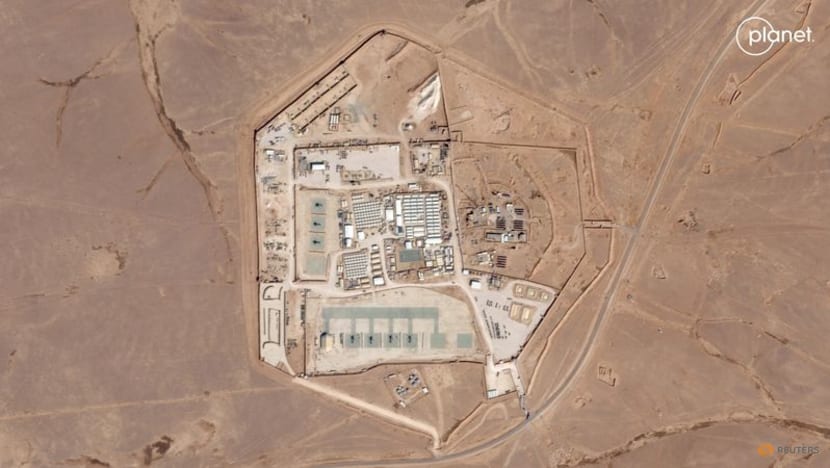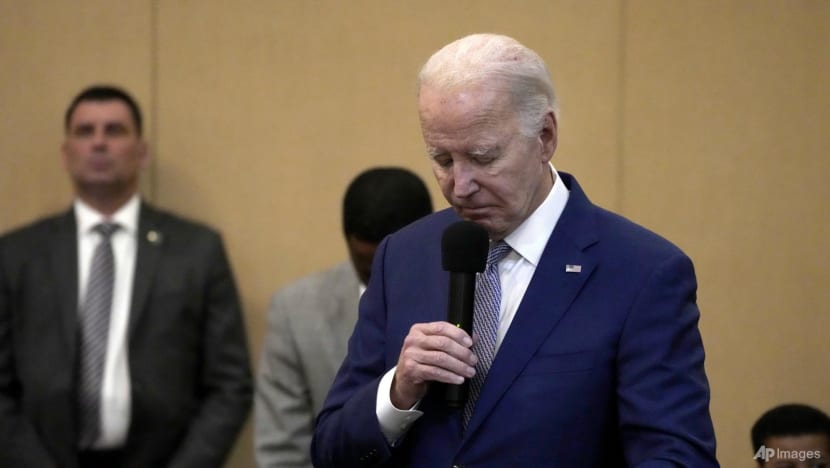Commentary: Biden faces escalation dilemma after US troops killed in Jordan strike
How will the Biden administration deal with Iran in the wake of the drone attack against a US military facility in Jordan? International security expert Stefan Wolff weighs in.

File photo. Satellite view of the US military outpost known as Tower 22, in Rukban, Rwaished District, Jordan on Oct 12, 2023. (Photo: Planet Labs PBC/Handout via Reuters)

This audio is generated by an AI tool.
BIRMINGHAM, England: The Middle East may be one step closer to more major conflict after a drone attack by Iranian-backed militants affiliated with the Islamic Resistance in Iraq against a US military facility in Jordan killed three American servicemen and wounded dozens more.
Iran has denied any direct involvement in the attack, but there is mounting pressure on US President Joe Biden to hold Tehran itself accountable.
Mr Biden has vowed to retaliate, but in a carefully calibrated and calculated way, saying that the US “will hold all those responsible to account at a time and in a manner of our choosing”.
This may satisfy the hawks, especially among Republicans in the US, but it reflects the tightrope that the Biden administration has to walk. It needs to punish and deter in equal measure.
Exactly how the drone penetrated US air defences to strike the troops in their sleeping quarters at the military base is another issue that will need scrutiny.
HOW WILL THE US RESPOND?
Above all, Washington needs to punish the Iranian-backed militants who carried out the attack. This makes good sense for the White House domestically and in relation to its Middle East policy. It will go some way to satisfy Mr Biden’s critics while also sending a clear signal that attacks on US forces in the region will not go unanswered.
The more decisive the strikes and the more they diminish the capabilities of Iran’s proxies in Iraq, the more they will also have a deterrent effect. Given the extremist ideology that motivates many of these groups’ rank and file, deterrence has limitations. Degrading their ability to strike - by targeting bases, training camps, and leaderships - will be the more important component of the US response.
Beyond Islamic Resistance in Iraq, a powerful US response might also give other Iranian proxies pause for thought whether they really want to risk a direct confrontation with Washington.
The more difficult question for the Biden administration will be how to deal with Iran. So far, Washington and Tehran have avoided direct confrontation, and Iran was quick to deny any direct involvement, claiming that it was not engaged in making decisions at the tactical and operational level of the various groups it has sponsored across the Middle East for a long time.
While this may or may not be true, it is somewhat beside the point - without Iranian support, these groups would not have the training or equipment to carry out their attacks. In this sense, Iranian culpability is hardly up for debate. The dilemma, therefore, is, how to weigh the short- and long-term consequences of any decision to hold Iran accountable.

AVOIDING DIRECT CONFRONTATION WITH IRAN
In the short term, the key consideration must be to avoid further escalation. This does not preclude a direct strike on Iranian territory, for example, on training camps for foreign militia groups, or on Iranian assets and personnel deployed in Iraq and Syria.
However, it needs to be limited and proportionate so that the Iranian regime, for its own domestic purposes, is not compelled to strike back directly at US forces in the region. Were that to happen, we would be one step away from a major direct confrontation that could spread like wildfire across the Middle East.
In the shadow of a US-Iran war, regional actors may well feel comfortable to attempt to settle old and new scores. This would add further pressure on Washington, and stretch its military assets in the Middle East, to protect its allies in the region, such as Jordan whose territory was attacked in the drone strike that killed the three American servicemen at the heart of this crisis.
Nor is it entirely clear what Washington’s endgame would look like if the US were drawn into full-scale and direct military confrontation with Iran - what would “victory” look like and at what price could it be achieved.
The danger is that, similar to US entanglement in Afghanistan and Iraq, expectations of how decisive and quick any kind of victory could be achieved would be unrealistic and certainly exacerbated in a presidential election year.
The repercussions of escalation would also go well beyond the Middle East and further test Washington’s ability to handle multiple simultaneous crises.
US distractions, including the beginning of presidential election campaigns, might also create the perception among other adversaries that they might have an opportunity to press their own agendas much harder now - whether this is Russia’s aggression against Ukraine or a Chinese move over Taiwan.
CHINA’S INFLUENCE OVER IRAN
Where does this leave Joe Biden? As every crisis also offers an opportunity, the dilemma for Washington may be resolvable in a way that both avoids near-term escalation and in the long term diminishes Iran’s ability to escalate and de-escalate at will.
Rather than striking Iran directly at home, taking aim at Iranian facilities and proxies especially in Iraq and Syria would loosen Tehran’s grip on two key allies and weaken its reach into Lebanon.
Similarly, continuing to degrade Houthi militants' capabilities in Yemen would undermine Iran’s ability to use proxies and claim plausible deniability in its efforts to sow instability across the Middle East. These steps, if successful, would also reassure US allies in the region that Washington remains a willing and able guarantor of their security.
At the same time, it will be critical for the Biden administration to manage relations with China. China has an interest in stability in the region and the US has an interest in China playing more of a role in restoring and then sustaining it. China is unlikely to have, let alone be willing to deploy, military assets at the scale that the US has in the region, nor would that be desirable from a White House perspective.
But China has, and should be encouraged to use, its influence over Iran and some of the Arab states in the region to push for de-escalation. If carefully managed by Washington and Beijing, this would also prevent renewed deterioration between these two major powers and could contribute in the long term to more stability in the Middle East and beyond.
Stefan Wolff is Professor of International Security at the University of Birmingham and Head of the Department of Political Science and International Studies.















